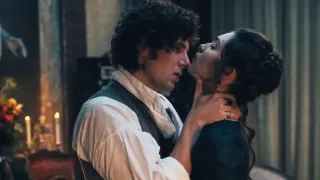October 4, 2017
Lawman
Kilian Melloy READ TIME: 4 MIN.
Wordy and cerebral, director Michael Winner's 1971 film "Lawman" is a study in different shades and modes of masculinity. From anarchic brutality to hierarchies of tribal loyalty to the cold, rigid framework of the law, manhood is strict and absolute in its unforgiving particulars. Bring two or more ideologies into conflict, and bloodshed is sure to erupt.
Such a story could be told in any place and time, but Winner's film -- with a script by Gerald Wilson ("Chato's Land," "Death Wish") -- is a Western. The lawman of the title is named Jared Maddox; he's the marshal for the town of Bannock. When a group of drunken cattle hands shoot up his town and kill one of its residents with reckless gunfire, Maddox tracks them back to their own settlement, a place called Sabbath. His intention is to bring them back to stand trial; Maddox knows that the cattle hands work for a wealthy rancher, a fellow called Bronson (Lee J. Cobb), and justice being forever vulnerable to the corrupting influence of cash the accused are doubtless going to be just fine. The point isn't justice so much as it Bannock doing his job for no greater reason than it is his job.
But Bronson's men are not so keen on having to go through the bother of a trial, whatever its outcome. Struggling cowpoke Adams (Robert Duvall), for instance, can't spare the time away from his own fields and livestock; it would be the ruin of him, and he'd rather resist Maddox, with a gun if necessary. Others resent Maddox's intrusion on principle, including Bronson's top hand Harvey (Albert Salmi), an unrepentant sort, and his son, Jason (John Beck), who has the looks of an underwear model and the ethical range of a cardboard box.
Bronson himself is more sober and reflective; when his men want to resolve the problem by killing Maddox, Bronson proposes the gentler alternative of buying him off instead. But what local sheriff Cotton Ryan (Robert Ryan) -- called "Cottontail" by the rough ranch hands for his meek affect -- knows forming an acquaintance with Maddox is that he's incorruptible, and not susceptible to the lure of gold.
Another old acquaintance is Laura (Sheree North) -- old flame might be a better word for it, actually, but nowadays Laura is hooked up with another of Bronson's men, Hurd Price (J.D. Cannon), a man with so little gumption that he follows Bronson out of sheer lack of agency.
The usual Western tropes are observed; there are a saloon and brothel, run by a fellow called Lucas (Joseph Wiseman), who, as it turns out, also knows Maddox from way back. There are quick-draw showdowns on the town's dusty street, while the locals look on eagerly. There's a would-be posse of community men such as shopkeeper Luther Harris (Walter Brooke), who would love to prove that they, too, are "real" men by driving Maddox off with blazing six-shooters. (When it comes down to it, all it takes is one stern word from Maddox to send them scurrying.)
And, of course, there's Maddox himself, a "man on a horse" riding straight out of the genre playbook and into a town that doesn't want him there -- a town, that, it has to be said, seems intent on committing an early version of suicide by cop. (In another twist, a scene in which Maddox guns down a fleeing suspect, shooting him in the back, resonates with today's debate on militarized, trigger-happy police. The moment is meant to underscore Maddox's inability to bring nuance to his role as enforcer of civilization's rules; Maddox's way of discharging his duty relies on discharging is weapon and he has become, as Julie Kirgo notes in her excellent liner notes, "robotic," anachronistic as the word might be. In the context of today, however, it's a stark reminder of the way that conduct by law enforcement once regarded as shocking has all but become a new normal.)
But this is no mere shoot 'em up; "Lawman" tackles murky, shifting ethical questions and follows them from vantage point to vantage point. The truth looks different from each perspective; we're left with the feeling that our hero is, perhaps an anti-hero, but it's hard to pin down exactly why. Meantime, putative bad guys like Bronson -- and one of his younger hands, the innocent Crowe (Richard Jordan), who wasn't even with the group when the shoot-up happened, but whose loyalty invests him in the situation -- turn out to have deep and even philosophical struggles around questions of force and frontier manhood. It's the Wild West, all right, but civilization -- and its discontents -- is beginning to blossom in the desert, thorns and all.
Cinematographer Robert Paynter photographs some stunning scenery, and he uses inventive, dynamic camerawork throughout -- though there are jolting moments when his restless camera refuses to linger on the features of the location's dramatic landscapes. The editing, by Frederick Wilson, also tends, here and there, to become something of a jumble, but that was not so unusual for 1971 when cinema was willing to be more experimental and films were less intensely committed to a slick, overly polished look than they are now.
This Twilight Time Blu-ray edition offers the original theatrical trailer, an isolated music track that showcases Jerry Fielding's score, and the above-mentioned liner notes essay by film historian Julie Kirgo.
"Lawman"
Blu-ray
$29.99
https://www.twilighttimemovies.com/lawman-blu-ray






